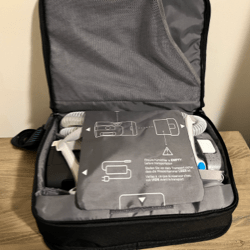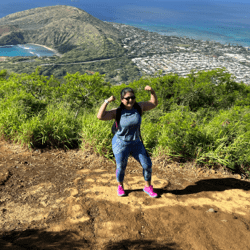5 Tips for Coping With Jet Lag as a CPAP User
It's been quite a few years since I've experienced jet lag while treating my sleep apnea with a continuous positive airway (CPAP) machine. That is, until recently when I traveled from Ontario, Canada to Oahu, Hawaii. In other words, we're talking about a time difference of 5 hours. So, I wanted to share my experience and these jet lag tips for CPAP users.
Tip #1: Plan to travel with CPAP

My CPAP snug in its case.
Before traveling , I did my research and found that my CPAP is considered a separate item from carry-on luggage or a personal item. Therefore, it was very convenient for me to carry it on the plane in its own case which holds all the parts safely and securely.
I was also delighted to find that the airplanes all had seat outlets where I could plug my CPAP in if I chose to. Going through security checkpoints was also easy. This is because I know I have to remove the main machine from the bag before sending it through the X-ray. I also chose not to take any distilled water with me.
Tip #2: Consider using CPAP on longer flights
On the first leg of the journey, I didn't feel sleepy so I didn't feel the need to use my CPAP. Although, my husband asked me not to use it for the risk of embarrassing myself (or him). He, however, slept for most of the time in the air.
Tip #3: Try a melatonin supplement
Upon arrival in Hawaii, it was 10 PM local time and by then, I was feeling tired. Unfortunately, I didn't go to sleep right away because we were catching up with the family we met there. Therefore, according to the MyAir app, I only slept for about 4 hours that night. The following night, however, I took a melatonin sleep supplement to help me fall asleep at a reasonable time. As a result, I woke up feeling rested, despite the time difference.
Tip #4: Try to adjust to the local time as soon as possible

Enough energy to hike the Koko Head trail!
For the rest of my time in Hawaii, I slept well every night and had lots of energy during the day. I know this is a result of using my CPAP every night as well.
I also found myself eating meals and sleeping according to the time zone. Additionally, light exposure is also important and can help reset your body’s internal clock. It was very easy to get some natural sunlight in the morning in Hawaii to help reset my body’s clock and adjust to the new time zone.
Tip #5: Give yourself time to recover from jet lag
On the return flights, I still didn't use my CPAP because we had 2 flights of less than 5 hours each. We left Hawaii at midday and arrived back home the next morning. Consequently, the MyAir app showed I didn't sleep at all that night!
Thankfully, I had the entire day to rest because of how I planned my time off. It is difficult for me to nap during the day since I started using CPAP. The conditions have to be perfect: blackout blinds closed; in bed in my pajamas; ear plugs in and of course, CPAP on.

Traveling with CPAP is a breeze!
Recovering from jet lag using CPAP tips
In conclusion, it did take me 24 hours to recover from the first trip, but the return trip was harder because I missed 1 night of sleep. Interestingly enough, my husband took longer to recover from jet lag than I did. For instance, he didn't use melatonin and didn't sleep and wake up according to our time zone when we returned home. In fact, a week after we returned, he still had difficulty falling asleep.
I certainly feel lucky that I have my CPAP because once I fall asleep, I'm out until time to wake up.
Do you have any jet lag tips for CPAP users? Please share a comment.

Join the conversation